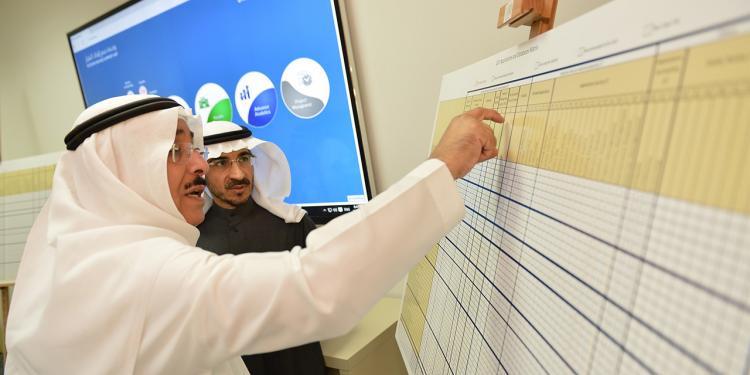On Monday February 8, 2016 the President of the University of Dammam Dr. Abdullah Al Rubaish observed the achievements of the Decision Support Unit and the outcomes of the complete project which was established by the Vice Presidency for Studies, Development and Community Service in the University of Dammam that will help to achieve the vision of the strategic goal of national transformation in order to achieve sustainability, decision efficiency, and to upgrade the level and quality of performance. Dr. Abdullah al Rubaish was accompanied by Dr. Abdullah Al Kadi the Vice President for Studies, Development and Community Service and the Director of the Unit Dr. Abdullah Al Muraih.
During his visit Dr. Abdullah Al Rubaish stated that “the unit helps in setting down the fine roles of decision making in UoD for measuring the institutional, financial, administrative, and technical performance in the University. The unit is a touchstone which serves the country and its citizens, it enhances the policies of development and economy that are based on knowledge, quality, and information proficiency through managing data, employing them, and upgrading the level and quality of performance that is a part of the development stages that the University is witnessing in the field of decision making in a professional and accurate way.
Dr. Al Rubaish added that “what distinguishes the unit is that it is a unit for supporting decisions that measures the performance and competency to achieve the goals of the national transformation which is led by His Royal Highness Prince Mohammad bin Salman Second Deputy Prime Minister, the Defense Minister, and the President of Economic and Development Affairs. One of the important roles of the unit is to manage information either developmental, economic, or social information.
Dr. Abdullah Al Kadi the Vice President for Studies, Development and Community Service and the General Supervisor of the unit declared that “One of the goals of the unit is to provide information and accurate data for decision-makers in the University using numbers and charts in order to make the proper decision in the proper time which will lead to improving the educational process therefore it will contribute in raising the level of competency and performance through accurate statistics which are in the interest of the beneficiaries of this institution and to achieve the vision of the higher administration in the University. In addition to that, the unit gathers data from different agencies that are part of the University such as colleges, administrations, King Fahad University Hospital, aspects related to patients, the type of care provided as well as developmental projects and all that is related to the administrative, financial, technical and academic aspects.
Dr. Al Kadi ended his statement by adding “the unit does not only serve the educational process but it has a continuous organizational job that the University seeks to achieve to raise the level of performance by managing data in decision support to transform data into information, numbers and indicators that institutions and businesses depend on and to link between the needs of the labor market and outcomes of the University and to build detailed databases for developmental issues related to the vision of the national transformation in the Kingdom.
Dr. Abdullah Al Muraih mentioned that “we started working on the DSU three years ago. The work consisted of collecting data, developing, analyzing, recording, and extracting smart and unconventional indicators for the targeted development and improvement plans which depend on performance indicators, analysis of local, regional, and international changes and how it reflects on development, community, economy, and industry as well as the expectations of the future and how to deal with them. To elevate the level of the coordination performance with different agencies to lay down the policies, goals, benchmarks, and monitor the execution of plans and projects. Also, the workflow in the unit achieves a number of the accreditation standards and affirms the quality of institutional performance in universities which has been narrowed down to 11 standards related to broad sectors of activities in higher education institutions through measuring the institution, quality, enhancement of procedures and operations, to make sure that the goals of the national transformation plan are achieved, to prepare and apply a unified methodology mechanism and measurement tools, and to manage the performance of equipment.

